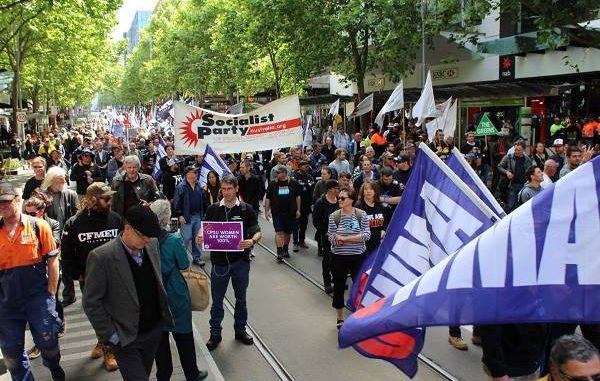
For the second time this year, workers took to the streets in a massive show of collective strength. The 23 October rally saw more than 100,000 people bring central Melbourne to a standstill, demanding that Australia needs a pay rise.
The rally came five months after the first mass protest of the Australian Council of Trade Unions “Change the Rules” campaign. It was endorsed in the weeks prior by a mass delegates meeting.
In a step forward, the Melbourne rally was not held in isolation. Multiple rallies were also held on the same day in different cities and towns. A total of 22 protests were held across the country, in late October, as part of the campaign.
While there was a prominent hi-vis contingent, workers had come out from a wide range of unions. Speakers included a cleaner from United Voice and a migrant farm worker from the National Union of Workers.
The rally also incorporated elements of stop work action with workers from the construction sector and the waterfront downing tools.
The central demand of the rally, that Australia needs a pay rise, is one that resonates with many working people. With the cost of living rising, and wages flatlining, it’s getting harder and harder to keep our heads above water.
As some speakers correctly pointed out, the bosses have had it all their way for far too long. Profits, productivity and CEO salaries are through the roof, while ordinary people are struggling to make ends meet. We desperately need a fightback against low pay, casualisation, underemployment and bosses scrapping union agreements to drive down wages further.
While the turnout was extremely impressive, the same could not be said for most of the speeches. Unfortunately, the “three steps to change the rules” that the union leaders put forward from the platform were more like missteps.
We were told that step one was to re-elect the Andrews Labor government in Victoria. Although Andrews likes to present a progressive image, when you scratch the surface, he is no friend of working people.
Labour’s record
During his time in power, Andrews has overseen the selling off of public land, the privatisation of the port, and most recently the selling off of the land titles office. Wages and jobs will suffer as a result.
Step two was to get a Shorten Labor government elected at the next federal election. It was quite telling that the crowd did not respond with much enthusiasm to this call. While there is definitely a mood to punish the Liberals, people are not excited about the prospect of voting in Labor.
This is because when in power, Labor has not implemented measures to improve people’s lives; in fact, they have generally done the opposite. People also know that the very rules we are trying to change were implemented by Labor!
Step three was just ‘change the rules’. No explanation about how this would be done was given, however the implication was that Labor would just do it for us.
A Labor government is no guarantee that the rules will actually be changed in working people’s favour. We should look no further than Labor’s U-turn to support the anti-worker Trans Pacific Partnership free trade agreement to see where their true allegiance lies. Far from relying on Labor, workers need to build their own political party.
What we really need to change the rules is a different approach. Instead of just focusing on the electoral arena we need to open up an industrial campaign. It was clear when 100,000 of us were on the streets where the real power in society lies. We brought the city to a halt!
Real power does not reside in the chambers of Canberra; working people have huge potential to make change if they act together. We should be relying on the collective strength of the union movement to put pressure on all the political parties, not just handing Labor a blank cheque.
A campaign that prioritises mass industrial action is the only way to really change the rules, regardless of who is in power. The October protests were a great start, but we need to take things further. Let’s make the next step in the campaign a one-day national stop-work and demand change now, not after the election.

Be the first to comment